On Wednesday morning early, we headed south to visit a new project area started by our implementing partner, St. Paul Partners (SPP) for the villages of Matamba and Nhungu. It is about a 5½-hour drive, with the last two hours up a very steep mountain road.
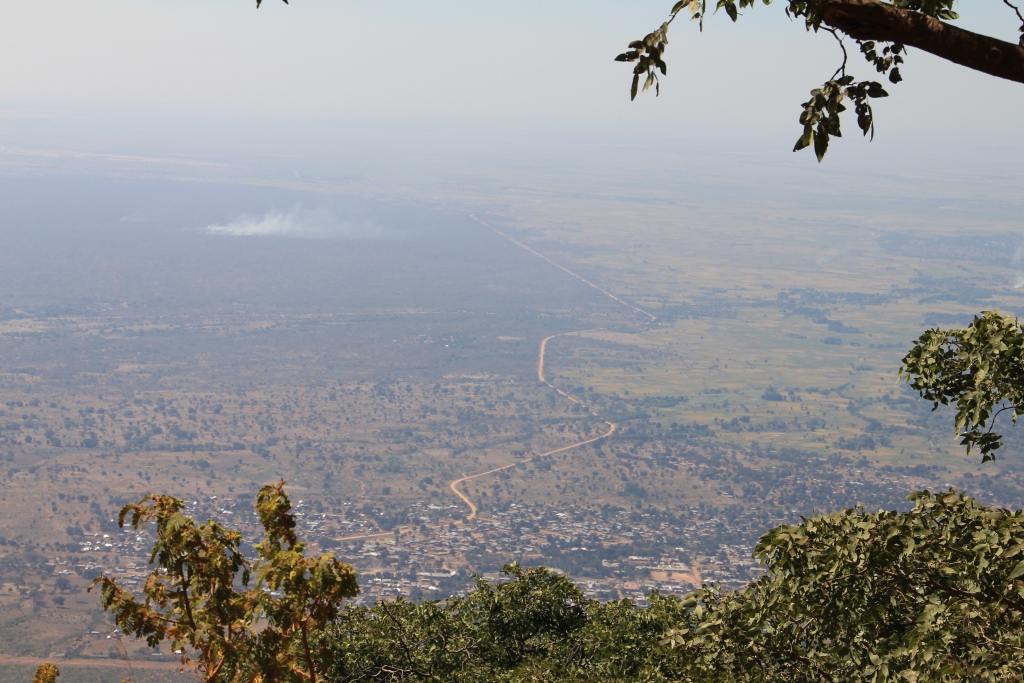
The road we traveled.
The picture above was taken from the road at the top of the mountain looking back down toward the valley floor. This spot is 800 meters (2,625 feet) above the valley floor. The mountain road is about 18 miles long from the main road and it took us about two hours to reach Matamba. The two villages, with over 6,000 people, are located on the plateau of mountain at the very top.
SPP is just underway with the 10 new projects, six in Matamba and four in Nhungu. It will take about 90-120 days to complete the 10 wells, because the logistics of getting equipment, tools, sand, mud, gravel casings, pumps, and cement to these remote locations is very challenging. These projects are being funded by the South Carolina Synod of the ELCA, through a special grant from Wheat Ridge Ministries, to assist the people of the SW Diocese of the Evangelical Lutheran Church of Tanzania (ELCT). This will provide a sustainable water supply for all the families in the two villages.
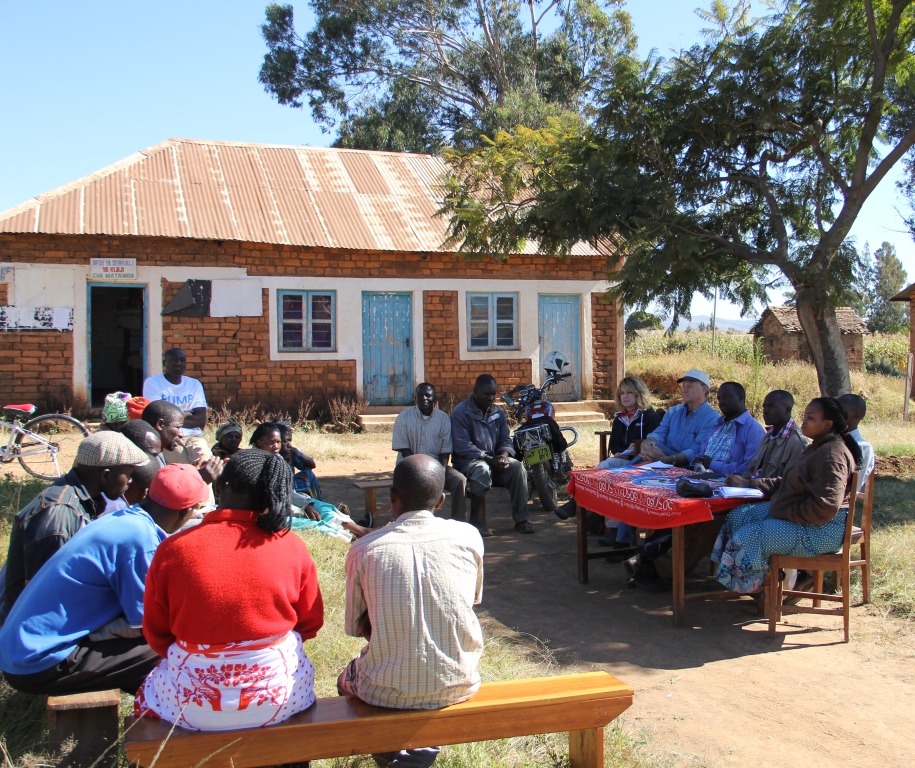
Meeting with committee and community members in Matamba.
SPP had conducted the initial community and WASH training in November and December of 2014. It was a joy to see the progress that the water committees and village leadership had achieved. The picture above shows the SPP and W2T team meeting with the water committee members and village leadership in Matamba, with a similar meeting In Nhungu. Both communities had already created all their governance structure, and each community had already saved more than $1200 in the bank for the maintenance fund. These are awesome achievements that show real commitment on the part of the communities to the sustainability of the projects.
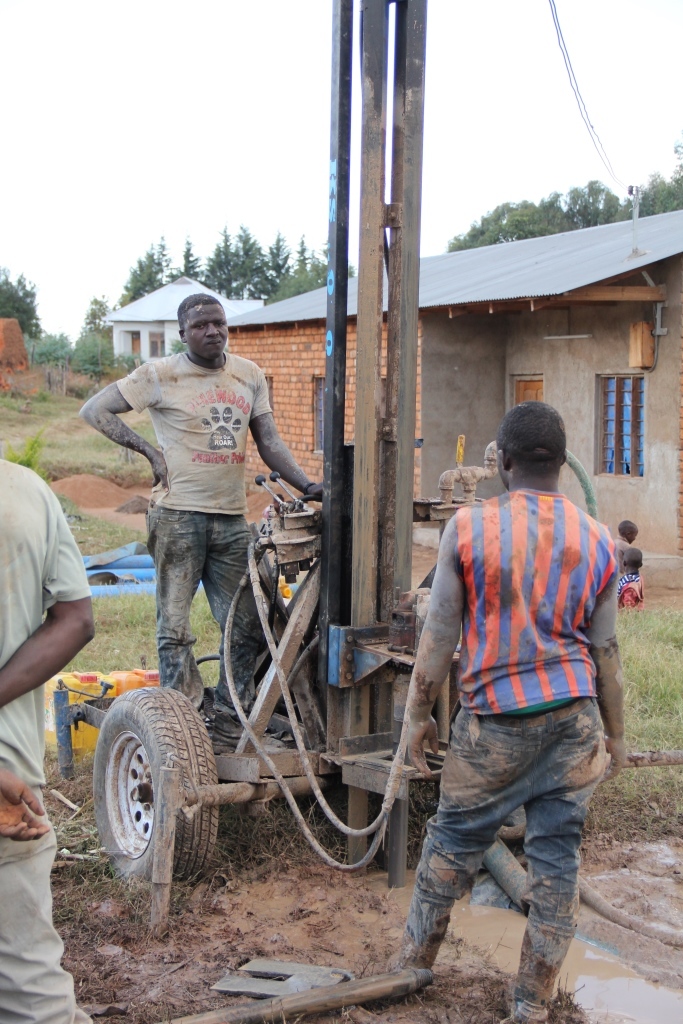
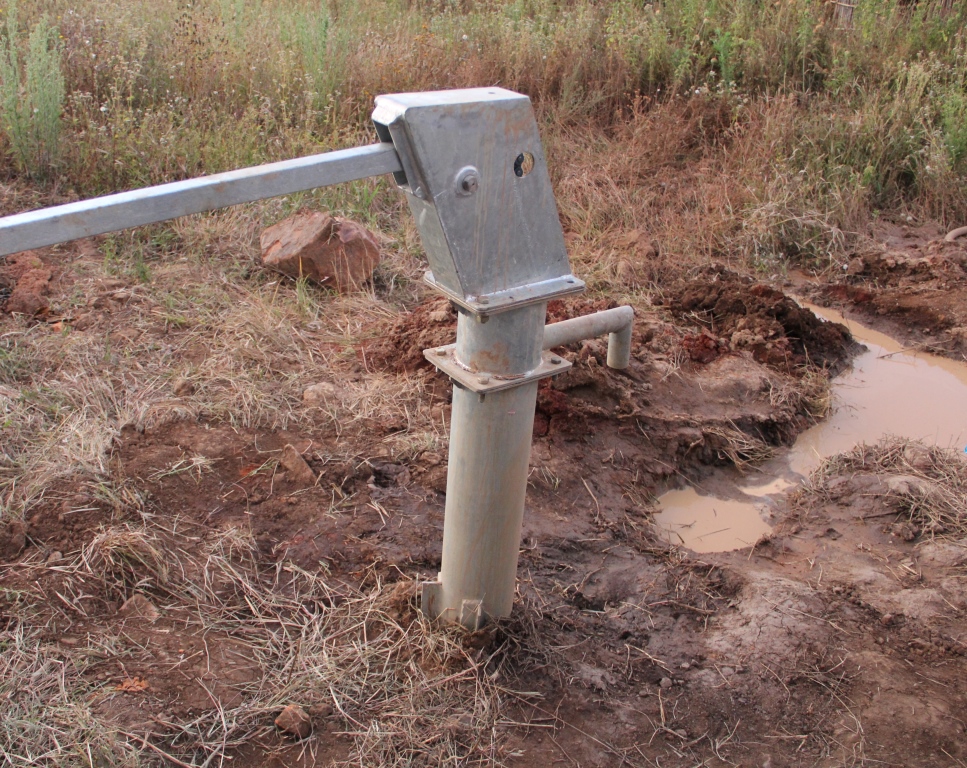
Water project work
There are two separate crews working on the these projects, and the two pictures above show the status of the first two projects. The first site (top) is still in the drilling phase, with a mud rotary drilling machine. It had reached the aquifer and was about to finish the drilling process. At the second site (bottom), the drilling has been completed, and the pump testing is underway.
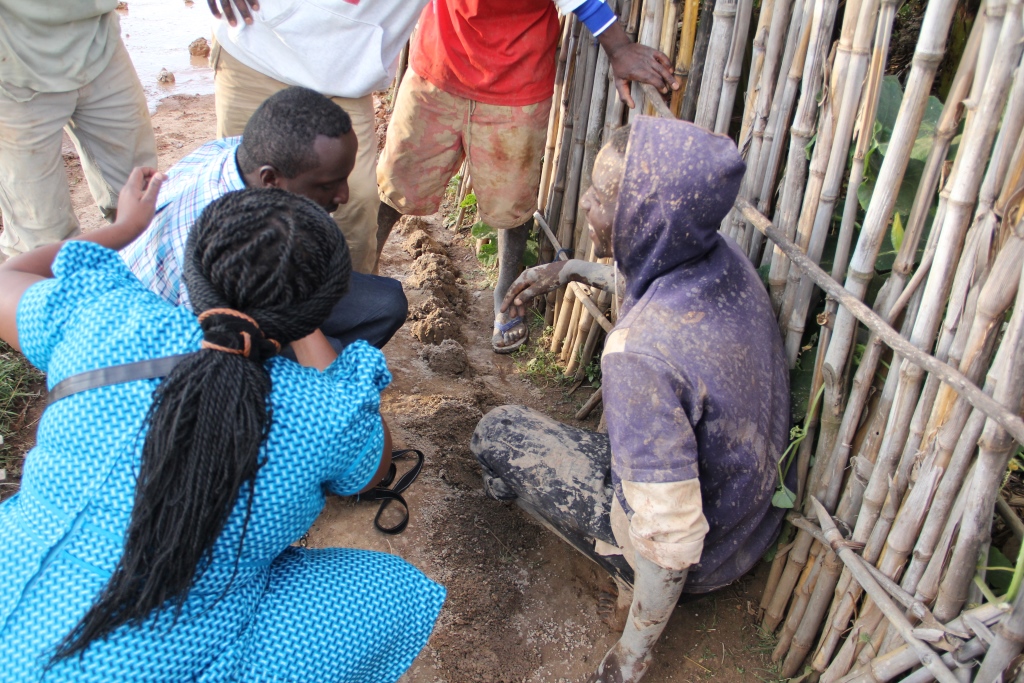
The team discusses of core samples from the well drilling.
Gashaw Semeneh, W2T’s Program Manager in Addis Ababa, has been accompanying the team on the trip. He is in the middle of the left side of the photo above, in the plaid shirt, having a discussion about the core samples taken during the drilling process. WIth him are Haneal, from SPPP (foreground) and the community’s drilling foreman (on the right). Gashaw is a degreed geologist and a certified hydrologist, so his advice and counsel have been extremely valuable for all the teams on the trip.
These new projects are off to a great start and the communities are very grateful for this blessing of clean water. They have been having to collect water from a nearby unprotected river or having to buy water from local vendors at very high prices. They believe the new access to clean, sustainable water will bring many positive benefits to the villages.
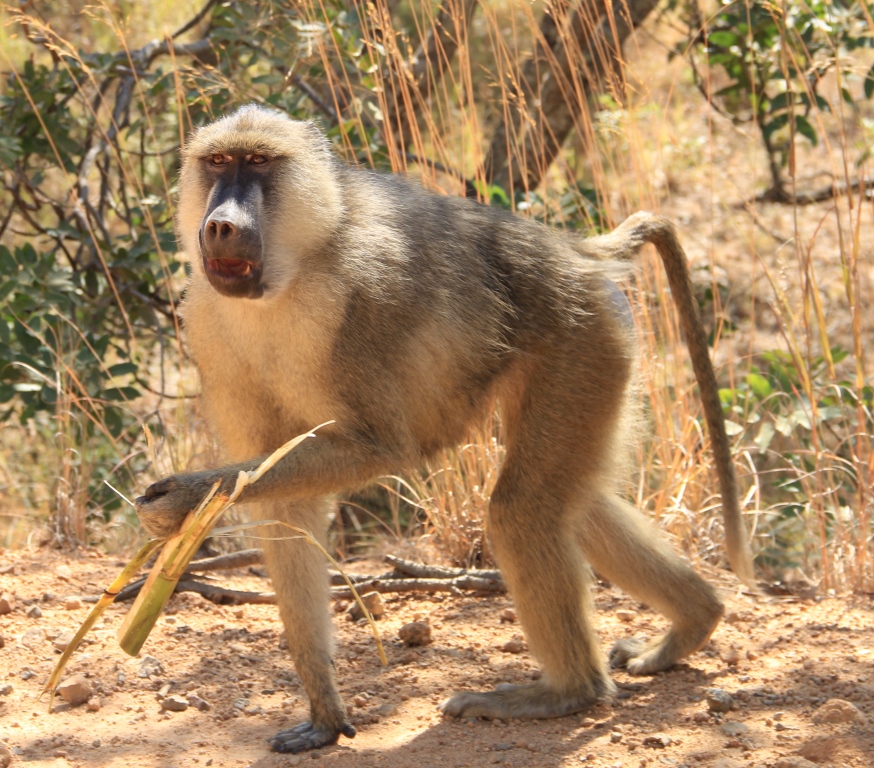
A Tanzanian yellow baboon
On the way down the mountain road, we met a new friend … a large male yellow baboon, one of the two baboon species native to Tanzania. He was happily eating on some sugar cane that someone had tossed to him.
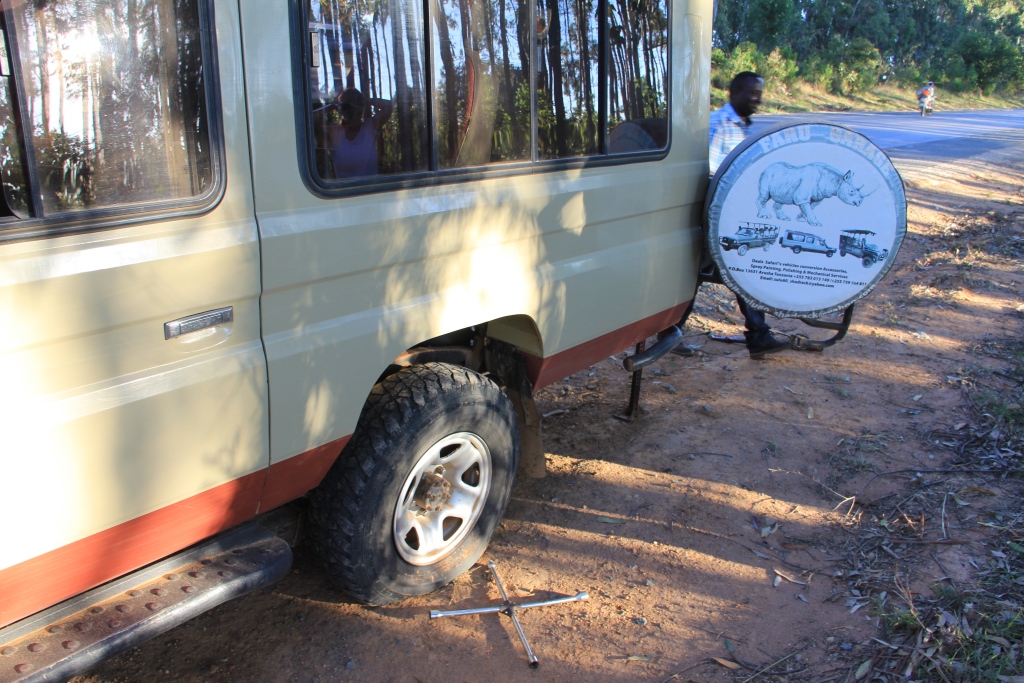
Expect the unexpected.
As we have said before, every day brings a surprise or two. Today, a flat tire on the way back to Iringa, adding to our five-hour trip!
Tomorrow is a travel day, a seven-hour drive from Iringa to Dar es Salaam, then a flight to Addis. On Saturday morning, we will meet the seven other travelers joining us for two weeks in Ethiopia. Watch for our next post this weekend.
On Wednesday morning early, we headed south to visit a new project area started by our implementing partner, St. Paul Partners (SPP) for the villages of Matamba and Nhungu. It is about a 5½-hour drive, with the last two hours up a very steep mountain road.

The road we traveled.
The picture above was taken from the road at the top of the mountain looking back down toward the valley floor. This spot is 800 meters (2,625 feet) above the valley floor. The mountain road is about 18 miles long from the main road and it took us about two hours to reach Matamba. The two villages, with over 6,000 people, are located on the plateau of mountain at the very top.
SPP is just underway with the 10 new projects, six in Matamba and four in Nhungu. It will take about 90-120 days to complete the 10 wells, because the logistics of getting equipment, tools, sand, mud, gravel casings, pumps, and cement to these remote locations is very challenging. These projects are being funded by the South Carolina Synod of the ELCA, through a special grant from Wheat Ridge Ministries, to assist the people of the SW Diocese of the Evangelical Lutheran Church of Tanzania (ELCT). This will provide a sustainable water supply for all the families in the two villages.

Meeting with committee and community members in Matamba.
SPP had conducted the initial community and WASH training in November and December of 2014. It was a joy to see the progress that the water committees and village leadership had achieved. The picture above shows the SPP and W2T team meeting with the water committee members and village leadership in Matamba, with a similar meeting In Nhungu. Both communities had already created all their governance structure, and each community had already saved more than $1200 in the bank for the maintenance fund. These are awesome achievements that show real commitment on the part of the communities to the sustainability of the projects.


Water project work
There are two separate crews working on the these projects, and the two pictures above show the status of the first two projects. The first site (top) is still in the drilling phase, with a mud rotary drilling machine. It had reached the aquifer and was about to finish the drilling process. At the second site (bottom), the drilling has been completed, and the pump testing is underway.

The team discusses of core samples from the well drilling.
Gashaw Semeneh, W2T’s Program Manager in Addis Ababa, has been accompanying the team on the trip. He is in the middle of the left side of the photo above, in the plaid shirt, having a discussion about the core samples taken during the drilling process. WIth him are Haneal, from SPPP (foreground) and the community’s drilling foreman (on the right). Gashaw is a degreed geologist and a certified hydrologist, so his advice and counsel have been extremely valuable for all the teams on the trip.
These new projects are off to a great start and the communities are very grateful for this blessing of clean water. They have been having to collect water from a nearby unprotected river or having to buy water from local vendors at very high prices. They believe the new access to clean, sustainable water will bring many positive benefits to the villages.

A Tanzanian yellow baboon
On the way down the mountain road, we met a new friend … a large male yellow baboon, one of the two baboon species native to Tanzania. He was happily eating on some sugar cane that someone had tossed to him.

Expect the unexpected.
As we have said before, every day brings a surprise or two. Today, a flat tire on the way back to Iringa, adding to our five-hour trip!
Tomorrow is a travel day, a seven-hour drive from Iringa to Dar es Salaam, then a flight to Addis. On Saturday morning, we will meet the seven other travelers joining us for two weeks in Ethiopia. Watch for our next post this weekend.

About The Author: Water to Thrive
More posts by Water to Thrive